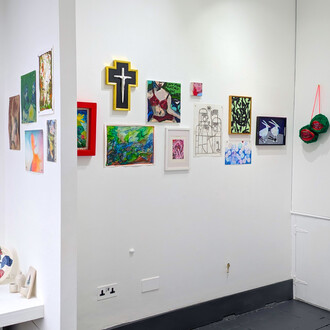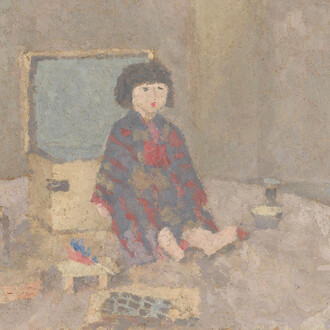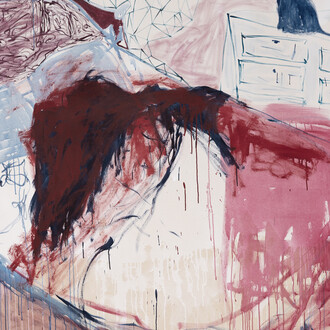‘I took my Power in my Hand’ is a group exhibition featuring the works of Mafalda Figueiredo, Alexis Soul-Gray, Olivia Strange and Henrietta Armstrong, presented by Liminal Gallery. Spanning painting, sculpture and mixed media works, the all femme exhibition centres on reclamation of ones Power. Each of the artists have been selected due to their powerful practice; thought provoking artworks which take space unabashedly. The title is taken from an Emily Dickinson poem of the same name, which speaks of the poet taking on the World. Similarly, all four of the artists unpack the expectations society has of a woman through their own lens or historically. Taking the World by the horns, the artists each confront the viewer head on, with unyielding yet intimate insights. ‘I took my Power in my Hand’ will be the debut physical exhibition of Liminal Gallery, founded in early 2021 with a series of innovative online solo exhibitions. Liminal represents emerging and mid-career artists working across the UK and Ireland today, showcasing the internationality and wealth of talent currently practicing in the countries, with a special focus on equal representation and diversity. Alongside the exhibition will be a series of talks with the artists, tours of the exhibition by the curator and a school programme. The exhibition will also form a fringe event of Power of Women Thanet, an annual festival which coincides with International Womens Day and supports the cultural activities of local female creatives.
Henrietta Armstrong (b. 1981, Torquay) is a multimedia artist and curator based in London, specialising in sculpture, installation and public art. She looks at man-made objects and structures from everyday technologies that are often obsolete or defunct, and the symbolism or meaning that we imbue them with. Her recent work has been looking at the brutalist forms of sea defences, sea erosion and the global threat of rising sea levels.
She was recently selected as a finalist for the National Sculpture Prize 2021 and awarded as a runner up for the Soho House Art Prize 2020. She is currently working on a public art commission for the village of Tytherington commissioned by Cotswold Homes & South Gloucestershire Council. This is to create a permanent sculpture celebrating Tytherington’s history and to integrate the growing community. Recent exhibitions include National Sculpture Prize Summer Exhibition at Broomhill Estate, TILT Summer Show at Hoxton Gallery, DOLOS - Rooftop Mural Project at Jealous Gallery, Art on a Postcard Summer Auction 2021 and Recreational Grounds: Off Site at Thames-Side Gallery. Her work has recently been taken into Soho House permanent collection and is held in private collections all over the world.
Mafalda Figueiredo (b.1991, Lisbon) is a figurative painter. She graduated from the Fine Arts University of Lisbon in 2013 and has subsequently worked in Berlin and London, where she is now based. Coming from an artistic family, creativity’s intrinsic to Figueiredo’s persona. As a child she always felt constrained and observed. This incited within her a desire to create, in order to live the freedom she longed for, through drawings and paintings she produced obsessively.
These feelings were intensified in adolescence as the artist became increasingly aware of the gaze of the opposite gender, the objectification of that very look, and the need to either shield from it or accept it. Figueiredo is interested in intuition, self-analysis and self-observation and believes every involuntary idea that comes to mind has meaning and comes as a message from the subconscious. She interprets spontaneous ideas as one interprets dreams: through a process of signification, looking at the visual elements as symbols and decoding their meaning according to the context and experience of the dreamer.
Through figurative painting, Figueiredo attempts to project this thought process into images. She portrays figures looking out of the painting as if they are struck by the realization of being observed. She’s interested in transitioning states, constantly questioning where and when one moves from the position of object of observation to observer, and the imaginary time and space between these two states.
Recently, her work has been exhibited in Berlin and London and international art fairs such as Positions Berlin and Volta Basel. In March 2020, Figueiredo had her debut solo exhibition in the US.
Alexis Soul-Gray (b.1980, UK) is a contemporary visual artist whose practice is often concerned with loss, memory and grief. Speculative questioning about the memorial, memory and commemoration brings together a conjecture of imagery taken from personal and public archival materials. Through painting, collage and print, Alexis defaces and rearranges found images - often working in layers, deliberately interrupting images through obstruction as an attempt to create a visceral representation of the thought process. Abstraction and figuration hold equal significance, Images are continuously intersecting, abrasive, harmonious, removed, a tangible manifestation of a multi-layered interior state. Alexis is also interested in the stillness found in studio shot images of children and women, floristry, knitting and antiques. Many of the images she works with date from the 1930’s-1980’s, representing personal ancestry, collective histories, traditions and loss. Alexis lives and works in Devon, UK.
Olivia Strange’s multi-disciplinary practice spans drawing, painting, installation, sculpture and sound/moving image. She makes multimedia installations often using found objects and materials, poetry, sound & video projection. The works are characterized by a layered narrative that aims to surface queer experience. Themes of ‘paradise’ and ‘escape’ are explored in the work through which aims to probe at the roots of oppressive normative ideals, offering alternative languages for distortion, desire, sexuality, fantasy and power-play. The work both employs and subverts traditional material processes and making methods to portray an alternative empowering image of female subjectivity in an eroticised state whilst refuting binary ideals of ‘femininity' and womxnhood.












